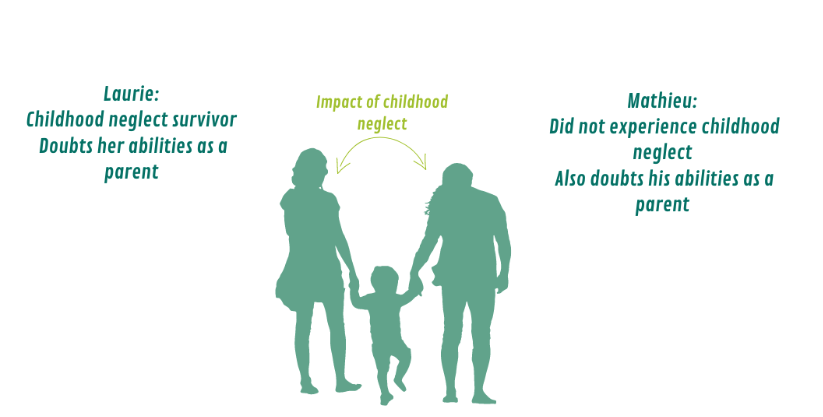Assessing and intervening with couples consulting for problems associated with the transition to parenthood
The transition to parenthood is recognized as a critical developmental stage in a couple's relationship, and is accompanied by major changes that are likely to influence the relational satisfaction of co-parents. This article outlines ways in which we can support couples who consult for difficulties related to this transitional period.
Authors : Mathilde Baumann, Claude Bélanger, Ph. D., Natacha Godbout, Ph. D.
Summary:
Parental transition is recognized as a critical developmental stage in the couple's relationship, and is accompanied by major changes likely to influence the relational satisfaction of co-parents. This article outlines ways to support couples who consult us for difficulties related to this transition period. After examining the determining factors associated with parental transition and the multiaxial assessment methods available, a protocol of the main behavioral and cognitive interventions designed to help remedy the difficulties associated with this period is detailed. These interventions target the inter- and intrapersonal spheres (e.g., parental alliance, parental identity, relational and sexual satisfaction). Finally, suggestions for the future of empirical research and therapeutic support for couples transitioning to parenthood are presented.
Am I a good parent?
Feeling effective as a parent when you lacked support and attention as a child.
Authors : Élise Villeneuve, Alison Paradis, Ph. D., Natacha Godbout, Ph. D.
Feeling competent as a parent when you lacked support and attention during childhood
“I'm afraid I don't know how to comfort you when you cry. I'm afraid I don't have enough patience with you. I'm afraid I'll make mistakes and not do the right thing in caring for you. I'm afraid of being a bad parent.”
The arrival of a new child is an event that can be both a source of happiness and stress, or, for some parents, a fear of not measuring up to the task. Faced with the constant needs of young children, in addition to comments from family and friends, the many standards prescribed in guides given to future parents (for example, From Tiny Tot to Toddler) and the ideals of the perfect family conveyed in the media, some parents struggle to see themselves as competent or effective in their role. They are haunted by the famous question: "Am I a good parent?”
These questions refer to the sense of parental competence, that is, the parent's confidence in their ability to meet the needs of their child (Hess, Teti, & Hussey-Gardner, 2004) . This feeling is important; it influences the parents' behaviours, favours a good adaptation to their role, as well as healthy relationships with the child, the other parent, and the environment (Caldwell, Shaver, Li, & Minzenberg, 2011).
The sense of parental competence is influenced by the parent's childhood experiences. In fact, from childhood, each person constructs an image of what a parent is and how they should act, by observing their own parental figures(Caldwell et al., 2011). Since they did not have access to consistent sensitive, loving, and caring parental models, people who have experienced childhood trauma may lack guidance on how to behave with their own children. Survivors of childhood trauma may feel lost and perceive themselves as "bad parents”. They may be more likely to doubt their parenting skills.
Recognizing these realities, our Project on Parental Couples team conducted a study of 871 parental couples of young children to document the relationship between psychological neglect and the sense of parental competence. We also examined how one parent's experiences may influence the other parents’ perceptions.
For this project, our team was interested in an insidious and subtle form of childhood interpersonal trauma, psychological neglect. This refers to the lack of behaviours that ensure the psychological well-being of one’s child (e.g., lack of affection, support, attention) (Leeb, Lewis, & Zolotor, 2011). For example, think of a parental figure who is not capable of:
supporting their child's self-esteem (such as not praising their child’s accomplishments);
making their child feel safe (such as not comforting their child who is scared or in crisis);
making their child feel worthy of love (such as not making their child feel loved, proud, and accepted by the parental figure).
Due to its nature, psychological neglect is difficult to identify and is mostly detected by observing its consequences (e.g., by a professional during a psychosocial follow-up for psychological difficulties). It is associated with negative effects on many aspects of children's development - emotional, social, cognitive, behavioural (Maguire et al., 2015) - and causes devastating effects in adulthood, including difficulties in developing and maintaining relationships, loneliness, social isolation and low self-esteem (Bigras, Bosisio, Daspe, & Godbout, 2020) .
The results of our study suggest that a parent's experience of psychological neglect during childhood is related to a lower sense of parental competence in adulthood. To better illustrate our findings, consider the case of Laurie, a survivor of psychological neglect:
When Laurie was a child, her parents were not around much, and she unfortunately did not receive the support, attention, or encouragement that was essential to the development of her confidence. Laurie is now the mother of a three-month-old baby. She is not sure she can identify why her baby is crying and believes she is not the best person to comfort her baby. Laurie's lack of confidence in her parenting skills seems to be related to her lack of interaction with her own parents. She realizes that she did not have a parental role model who met her emotional needs. In turn, she has difficulty assessing whether she is doing the right things to comfort her child. She doubts her parenting skills, regardless of whether or not she seems to be doing the right thing.
Most parents care for their child with the help of another parent. Drawing on our team's complementary expertise with intimate partners and knowing the importance of mutual influences within an intimate relationship, we also asked whether one parent's experience of psychological neglect is associated with the other partner's sense of parental competence, and vice versa. Our results suggest that a parent's experience of psychological neglect is related not only to their own sense of parental competence, but also to that of their partner.
Let's take Laurie's case again, but this time let's also consider the experience of her partner, Mathieu:
Mathieu did not experience neglect as a child. Like most parents, Mathieu sometimes has doubts about his abilities as a father. As for Laurie, her experiences of psychological neglect have made her more fragile. She now feels ill-equipped and lacks confidence in her role as a mother and in her interactions as a co-parent with Mathieu. In turn, Laurie finds it difficult to make Mathieu feel that he is a good father and doing the right thing. In turn, without his partner's validation and trust, Mathieu also feels less effective as a father. Thus, even though Mathieu has not experienced psychological neglect, the repercussions of Laurie's lack of love and support as a child affect him as well.
To all parents, know that it is normal to doubt your skills at times. It is important to remember that parenting does not come with an instruction manual. Remember that a parent is a human being with qualities and flaws.
If you have difficulty perceiving yourself as a competent parent:
Do not hesitate to talk about it and seek help. Talk to your loved ones, other parents, or professionals. Putting your concerns into words can help you gain perspective. It reminds you that it is normal to have doubts and to experience difficulties at times and can help you feel more confident in your role as a parent.
Do not be afraid to educate yourself and normalize your experience, that is, to understand that you are not alone in experiencing the challenges of parenthood. Do not be ashamed of your own or your child's emotions.
Remember that your child has no control over the intensity of their emotions, and that all parents experience their child's emotional outbursts. It's a normal part of children's development, although you may feel helpless or overwhelmed at times!
If possible, turn to the other parent and/or your partner, who is usually in a good position to support you in your care and experience.
Finally, know that there are many resources to help you feel more competent as a parent. Below is a list of resources that may be of interest to you.
General Resources for Parents
Info-Social ou Info-Santé :
24h/24, 7 days
Info-Santé (option 1) or Info-Social (option 2) 811 is a free and confidential telephone consultation service. If necessary, the counselors can refer you to an appropriate resource in the health and social services network or to a community resource.
24h/24, 7 days
Service provided by specialists in the parent-child relationship. Telephone service (1-800-361-5085) and online chat.
Monday to friday, from 8am to 5pm
A free, anonymous professional consultation service on parenting and parent-child relationships.
Telephone service 514 525-2573
Toll free (region) 1 866 329-4223
Organization offering professional legal services and advice, a community resource bank, information sessions and a crisis line for people experiencing family problems.
Montreal 514 593-4303
Toll free (region) 1 800 361-8453
Le Réseau pour un Québec Famille :
The Réseau pour un Québec Famille is a non-profit national organizations targeting the situation of Quebec families. Their website helps you discover the family homes in your region.
Institut National de la Santé Publique du Québec :
Lists with links to associations, organizations and support groups in Quebec that can help parents (Quebec food banks, early childhood resources, support during a perinatal bereavement, etc.).
Educational Resources
Becoming a parent – Gouvernement of Quebec :
A guide providing an overview of government programs and services available to new or expecting parents.
The baby - Gouvernement of Quebec (INSPQ) :
A guide that includes information on the different characteristics of the newborn, ways to communicate, sleep and child development.
Canadian Paediatric Society - Caring for kids:
Site offering information from Canadian pediatricians on the health and well-being of children and adolescents
Site publishing articles and scientific resources for parents and families.
Bigras, N., Bosisio, M., Daspe, M.-È., & Godbout, N. (2020). Who Am I and What Do I Need? Identity Difficulties as a Mechanism of the Link Between Childhood Neglect and Adult Sexual Disturbances. International Journal of Sexual Health, 32(3), 267‑281. https://doi.org/10.1080/19317611.2020.1796881
Caldwell, J. G., Shaver, P. R., Li, C.-S., & Minzenberg, M. J. (2011). Childhood Maltreatment, Adult Attachment, and Depression as Predictors of Parental Self-Efficacy in At-Risk Mothers. Journal of Aggression, Maltreatment & Trauma, 20(6), 595‑616.
Hess, C. R., Teti, D. M., & Hussey-Gardner, B. (2004). Self-efficacy and parenting of high-risk infants : The moderating role of parent knowledge of infant development. Journal of Applied Developmental Psychology, 25(4), 423‑437. https://doi.org/10.1016/j.appdev.2004.06.002
Leeb, R. T., Lewis, T., & Zolotor, A. J. (2011). A Review of Physical and Mental Health Consequences of Child Abuse and Neglect and Implications for Practice. American Journal of Lifestyle Medicine, 5(5), 454‑468. https://doi.org/10.1177/1559827611410266
Maguire, S. A., Williams, B., Naughton, A. M., Cowley, L. E., Tempest, V., Mann, M. K., Teague, M., & Kemp, A. M. (2015). A systematic review of the emotional, behavioural and cognitive features exhibited by school-aged children experiencing neglect or emotional abuse. Child: Care, Health and Development, 41(5), 641‑653. https://doi.org/10.1111/cch.12227
Parents confined with a newborn: the pandemic also had positive effects
https://theconversation.com/parents-confines-avec-un-nouveau-ne-la-pandemie-a-aussi-eu-des-effets-positifs-164365
Authors: Alison Paradis, Ph. D., Emily-Helen Todorov, Natacha Godbout, Ph. D.
For parents, the Covid-19 pandemic and health measures have created new challenges, reducing their social support systems, threatening their financial security and limiting access to essential services.
The increase in mental health problems, alcohol consumption and suicidal thoughts during the pandemic is well documented among parents.
Yet we know little about the specific effects of Covid-19 on the parents of a newborn, and even less about the impacts on their relationship and parenting experience.
Our research into this question shows that the consequences of the pandemic may not only be negative for these parents.




